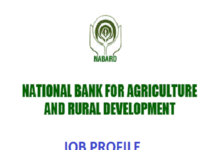Tips to crack the NABARD Exam in first attempt

National Bank for Agriculture and Rural Development (NABARD) has published an advertisement recently to recruit Assistant Managers in Grade A and Managers in Grade B in its various offices across the country. The bank has changed the pattern of examination this time and most of the candidates will be facing a completely new format of questions and it is not easy to crack this exam in first attempt The best way to approach the examination is to go through the syllabus and understand it. The Next logical step will be to study the whole thing from proper sources. We shall try to find out what does it take to make it to the final list of the examination with minimal but smart work.
New Exam pattern of NABARD Grade A and B Officer
So, we have understood the syllabus of the examination and the examination pattern as well. Now, let us see how to handle it effectively so that your name appears in the list of finally selected candidates for the posts
• English: There will be 40 marks for English in the preliminary examination and a descriptive paper in the main examination to test your writing skills. For preliminary exam, prepare as you are doing for other bank examinations and for the main part, start practicing writing précis, letters (both formal and informal), paragraph, etc. The questions will not be different from other bank examinations and as most of you are already preparing for the same, just carry on with that.
• General Awareness: This section carried 20 marks in the preliminary examination. To master this section, go through the events of current affairs for the last 6 months of national and international importance, study the static GK sections such as country and capital, currency, etc. as it comes in the IBPS examinations. Brush up your banking awareness, knowledge a bit. This will do the trick enough for you.
• Computer Awareness: This will be the easiest section of all. Go through the basics of computer hardware, software, printers, operating system, etc. Do not go into deeper details of these things. The section is of 20 marks in the preliminary examination
• Quantitative Aptitude: This section carries 30 marks in the preliminary examination. The questions will be from profit and loss, average, simple and compound interest, time and work, time and distance, pipe and cistern, number system, missing number in the series, etc. Get the basics of the arithmetic chapters right and then practice as much as you can
• Reasoning: This section carries 40 marks in the preliminary examination. The syllabus covers letter series, coding-decoding, sitting arrangement, puzzles, input-output, etc. Again, the trick is the same as the Quantitative Aptitude section: Get the basics right first and then practice
• Economic and Social Issues: This paper was not there in the prelims exam last year, but it has been included this year. The syllabus is huge, but it is expected that questions will be of elementary nature because the eligibility required is a graduate or post-graduate in any stream. Take one topic at a time and go through the basics of the same and some current events related to it. Do the same for all the topics. It is not about practice, so do not bother about that regarding this section, rather read as much as possible in order to gather knowledge in all the areas mentioned in the syllabus
• Agriculture and Rural Development: This will be the trickiest section of the whole recruitment exercise. Most of the candidates are not aware of the topics mentioned in the syllabus. Grab a book with a very elementary description of agriculture issues or go for internet browsing. Take a topic and read about it not in great detail, but as much as you know it. The questions are expected to be directed in this section, so do not take much stress regarding this. Read again and again since this will be new for most of you. Complete the whole syllabus at least once before going for the examination. Practice is again not the key in this section as well, but your knowledge will be. In prelims, the section carries25 marks, whereas in mains, there will be a paper of 100 marks on economic and social issues and agriculture and rural development
• Development Economics, Statistics, Finance and Management: The syllabus is given in this paper and again the questions are expected to be of elementary nature direct questions. Finish off all the topics in the syllabus at least once before appearing in the examination. Internet will be your best companion in preparing for the topics.
Tricks you should follow during the preparation as well as examination phase:
- Practice Quant and Reasoning: These are the two sections that need extensive practice. The syllabus will be covered easily, but lack of practice negates the hard work done by the candidates. So, practice questions from these sections to avoid exam centre blues
- Understand what you are reading: This is mostly for the newly introduced sections. Do not mug up without getting any idea of what you are mugging up. Read, understand and revise. You do not have much time to revise and revise again and if you go through the topics without understanding, there are high chances that you forget everything in the examination hall
- Focus on English: This section will decide your fate since it carries 40 marks in prelims and another 100 in the Mains examination. So, get the basics of grammar right, practice reading comprehension and Cloze test questions. The advantage of the section is you do not have to spend as much as time as reasoning and mathematics, but you get the marks if you are good at it
- Prelims and Mains are on the same day: Not literally, But obviously in other words. But get it into your head that, you are going for mains. That means, you should prepare for both prelims and Mains examination simultaneously. Do not think about prelims and its results and then mains. This is a single process and consider it the same way
- Do not think too much about unknown sections: This is the biggest mistake that is done by the candidates once the syllabus is changed. They focus too much on the changed part and forget that there are known and tested sections that may fetch them marks. So, strengthen the sections you know well before fretting over the unknown
- Mock Tests: This is helpful for any competitive examination. Go for mock tests before the examination, but choose wisely in a congested market for competitive examination preparation institutes. But do not just go for mock tests, analyze your weakness after taking one and before appearing for the next
NABARD Grade A and Grade B are basically specialized jobs because you will always be involved in agriculture related issues. Nevertheless, the salary package, good postings makes it a lucrative career option for the banking aspirants. Promotional avenues will also open up in the near future. The opportunity is there to make the most out of it and do exactly the same.
Previous year cut offs of NABARD Manager/Asst. Manager Exam
ALL THE BEST FROM TEAM SEHPAATHI!!


















